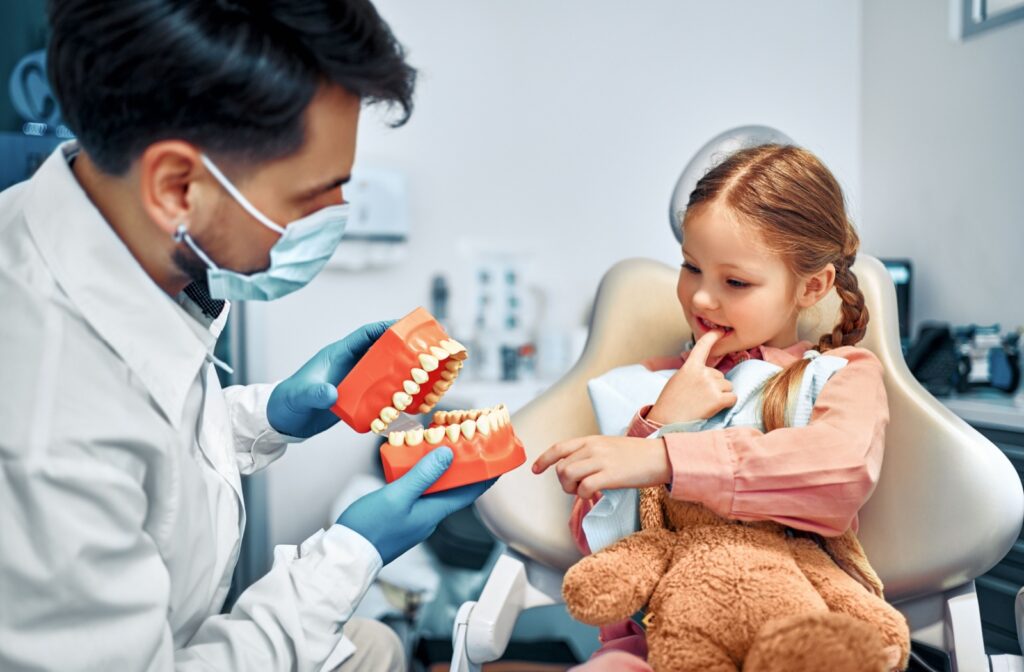
We all know life gets busy. When you’re juggling work, family, and everything else, it’s easy for dental checkups to fall off the radar. But skipping routine care doesn’t mean nothing is happening in your mouth. Dental issues can develop slowly and can be hard to detect on your own.
In general, adults should visit the dentist every 6 to 12 months. These visits aren’t just about clean teeth—they help protect your long-term oral and overall health, giving your dental team a chance to catch concerns early.
Why Regular Dental Visits Matter
Dental visits do more than just clean your teeth. They provide preventive care that helps reduce the risk of you developing serious oral health problems down the line. At each visit, your dental team checks for:
- Plaque and tartar buildup that regular brushing can’t remove
- Early signs of gum disease or tooth decay
- Signs of enamel erosion, cracks, or wear
- Tissue changes that may point to oral cancer
- Bite and jaw alignment issues that could affect comfort or function
These exams can also detect signs of health conditions that show up in the mouth first. For example, unmanaged gum inflammation has been linked to systemic health problems like heart disease and diabetes.
And while it might feel like you’re doing fine without a visit, small issues can be hard to notice on your own. Pain often shows up late in the game—after the damage has progressed.
How Long Is Too Long?
For most people, waiting longer than 12 months between visits increases the risk of complications. Even if you don’t have symptoms, there may be issues developing under the surface that only your dentist can spot.
Some dental problems take time to cause pain or become visible. For example, gum disease can progress from gingivitis to periodontitis with little or no discomfort in the early stages. Cavities can also begin to form between teeth or beneath old fillings without being felt at all.
Routine cleanings remove hardened plaque (tartar), which can’t be brushed away at home. Skipping regular appointments means letting buildup accumulate which can lead to inflammation and infection over time.
If it’s been more than a year since your last checkup, you’re due. If it’s been longer than two years, you could be missing key warning signs.
Signs You Should See a Dentist
You may have had a recent cleaning, but that doesn’t always mean you’re in the clear until your next one. Symptoms can pop up unexpectedly and may indicate a deeper issue.
Call your dental team if you notice:
- Bleeding or swollen gums
- Tooth sensitivity that lingers
- Persistent bad breath
- Mouth sores that don’t heal in 10–14 days
- Pain while chewing or biting
- Jaw soreness, tightness, or clicking
- A loose or shifting tooth
- Spots, cracks, or dark areas on a tooth
These signs can indicate anything from minor gum inflammation to a serious infection or abscess. Catching them early can help prevent further damage or the need for more complex treatment.
How Often Should Adults See the Dentist?
In general, adults should schedule a dental checkup and cleaning every 6 months. However, some people with excellent oral hygiene and low risk for cavities or gum disease may be able to go up to 12 months between visits.
Those who may need more frequent visits include:
- Smokers or tobacco users
- People with diabetes or heart conditions
- Those taking medications that cause dry mouth
- Anyone with a history of gum disease
- People undergoing orthodontic treatment
- Adults who frequently experience cavities
Your dentist will help determine the right interval based on your specific health history and oral condition.

How Often Should Kids See the Dentist?
Children should visit the dentist by their first birthday or within six months of their first tooth erupting. After that, dental visits every 6 months help maintain healthy development through childhood and adolescence.
These appointments help:
- Monitor new teeth as they grow in
- Prevent early decay or enamel damage
- Guide brushing and flossing routines at home
- Build a child’s comfort and trust with dental care
To help young patients adjust, dentists may use a gradual approach that keeps the environment friendly and stress-free. A positive experience early on can set the stage for healthy lifelong habits.
Catch Up on Your Smile
If it’s been a while since your last dental visit, don’t stress. It’s never too late to prioritize your oral health. Whether you’re due for a cleaning, have a question about symptoms, or just want to check in, a comprehensive exam can offer peace of mind and a clear next step.
Book your next appointment with Happy Sapiens Dental and take that first step toward a confident, healthy smile!


